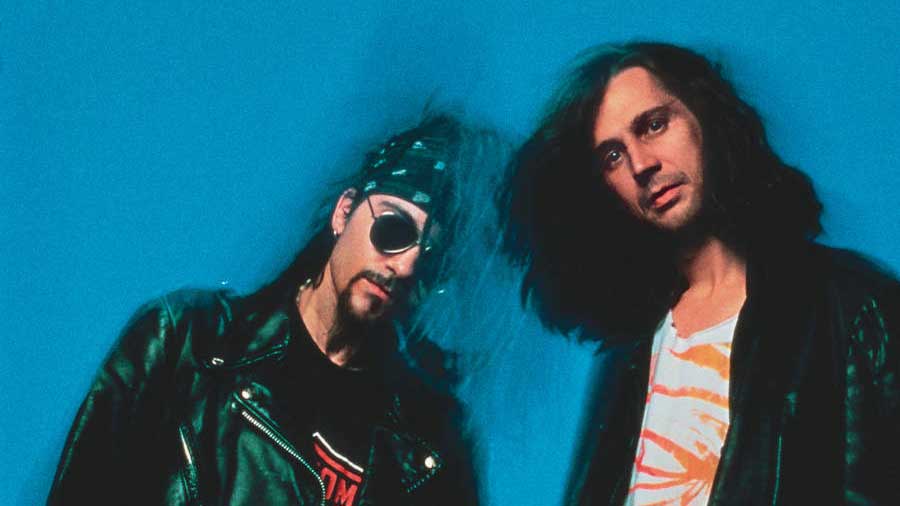The story of Ministry's Jesus Built My Hotrod: "Gibby threw up, spit up some gibberish and left"
Finished off when a drunken Gibby Haynes staggered into the studio and babbled a load of nonsense, Ministry's Jesus Built My Hotrod became a big seller and a middle finger to the label

In the summer of 1991, Al Jourgensen was convinced he had a killer new song. But something was amiss. Jesus Built My Hotrod, co-written with other members of Chicago’s industrial-metal band Ministry, wasn’t going anywhere.
“We had the song recorded and I tried singing a couple of times, but I never liked my vocals,” he explains. “I kept trying to do these kind of esoteric and intelligent lyrics on it. So I couldn’t quite nail the song, but I knew it was powerful in a strange way. It felt like rockabilly from the future.”
The solution was to be found by chance, at Lollapalooza. Then in its inaugural year, and featuring Jane’s Addiction, Nine Inch Nails, Living Colour and more, the festival swung into Chicago in early August. One of the opening acts was Butthole Surfers, whose lead singer, the estimable and self-willed Gibby Haynes, bumped into Jourgensen backstage. The miscreant pair had first crossed paths while touring the United States some months earlier and had bonded over a bag of magic mushrooms at a Holiday Inn.
“I got talking to Gibby and asked if he’d like to come over to do some stuff with us in the studio later,” Jourgensen recalls. “But when he arrived he was completely shitfaced drunk. He was more fucking wasted than I was. It was one of those things where you’re thinking: ‘Okay, where do we go from here?’”
Jourgensen played him what they had of the troublesome Ministry track and explained that they were struggling to finish it. “Gibby goes [in slurry drunken voice]: ‘Don’t worry, I got this one. It’ll be fine.’ So we set up the stool for him out in the vocal booth of the studio.” With a microphone and a fifth of Jack Daniel’s, Haynes got to work. Sort of.
“Within ten minutes he’d thrown up and fallen off the stool,” Jourgensen says, laughing. “And we’d got nothing. Eventually we propped him back up, and he just started singing complete gibberish. He was going: ‘Bing bing bing bang a bong bong bing bing binga binga…’ But it sounded really cool and just seemed to fit the track. Then he passed out. Basically, Gibby just showed up, threw up, spit up some gibberish and left. But he was exactly what was needed. We finally had a song.”
Jourgensen spent the next two weeks painstakingly editing the track on quarter-inch tape, cutting and splicing by hand. He added drag racing samples, backward noises and a screeching blues solo from guitarist Mike Scaccia. The whole thing, driven by Jourgensen’s monster riff and drummer Bill Rieflin’s “redneck thrash beat”, was topped off by a spoken-word intro that seemed perfectly aligned to the track’s air of nonsensical mayhem: ‘Soon I discovered that this rock thing was true/Jerry Lee Lewis was the devil, Jesus was an architect previous to his career as a prophet/All of a sudden I found myself in love with the world/So there was only one thing that I could do/Was ding a ding dang my dang a long ling long.’
Sign up below to get the latest from Classic Rock, plus exclusive special offers, direct to your inbox!
By then, Ministry should have been well under way with their fifth album, a belated follow-up to 1989’s The Mind Is A Terrible Thing To Taste. But internal strife and chronic substance abuse (the latter by Jourgensen in particular) meant that hardly anything had been done. They had also blown most of Sire’s advance on drugs. The label, affiliated to Warner Brothers, were understandably restless.
“Warner Brothers had given us a lot of money to do this album, and we really didn’t have any songs yet,” says Jourgensen. “And they were adamant about hearing something that we’d done. Irefused to send them any demos, because these people really didn’t know anything about music, they were clueless. But they kept putting the pressure on. So I decided to send them Jesus Built My Hotrod. They were crestfallen, they were absolutely horrified: ‘This is not Ministry, this is the worst piece of shit song we’ve ever heard in our lives.’ But I told them that’s all I had.”
Never one to shrink from confrontation, Jourgensen gave the label an ultimatum: either cancel Ministry’s contract, or send more money to complete the album. Sire chose the second option. Mindful of recouping their losses, and despite reservations, they released Jesus Built My Hotrod as a single that November.
To Sire’s amazement, it proved to be a tearaway success. The track quickly became a fixture on college radio and alternative rock charts. By early summer of 1992, at which point Ministry were finally ready to release its parent album, Psalm 69: The Way To Succeed And The Way To Suck Eggs, the single had sold 130,000 copies. And it kept on selling.
“Warners had figured they could finally get rid of me by releasing the single, because they thought it would bomb and people would hate it like they hated it,” Jourgensen reckons, “and Ministry would just go away and everything would be great in their little fantasy bubble. But what happened was the complete opposite. It went on to outsell Prince and Madonna on Warner Brothers during that time. And all of a sudden they started being nice to me.”
Psalm 69 swiftly became Ministry’s biggest album thus far, making the Billboard Top 30 and eventually going platinum in the US. It also established the band at the forefront of the industrial rock movement that was starting to infiltrate mainstream America in the early 90s. For Jourgensen, ever suspicious of the major-label industry, it was a sweet payoff.
“Just knowing the circumstances, knowing how we even got Jesus Built My Hotrod, was the biggest ironic laugh I think I’ve ever had in my life,” he says. “I laughed my ass off. After being told it was a piece of shit and that they hated me and all that, I knew that behind the scenes the label were now scrambling to take credit for it, saying they were behind it the whole way. I was like: ‘Oh yeah? Fuck off!’”
Freelance writer for Classic Rock since 2008, and sister title Prog since its inception in 2009. Regular contributor to Uncut magazine for over 20 years. Other clients include Word magazine, Record Collector, The Guardian, Sunday Times, The Telegraph and When Saturday Comes. Alongside Marc Riley, co-presenter of long-running A-Z Of David Bowie podcast. Also appears twice a week on Riley’s BBC6 radio show, rifling through old copies of the NME and Melody Maker in the Parallel Universe slot. Designed Aston Villa’s kit during a previous life as a sportswear designer. Geezer Butler told him he loved the all-black away strip.

